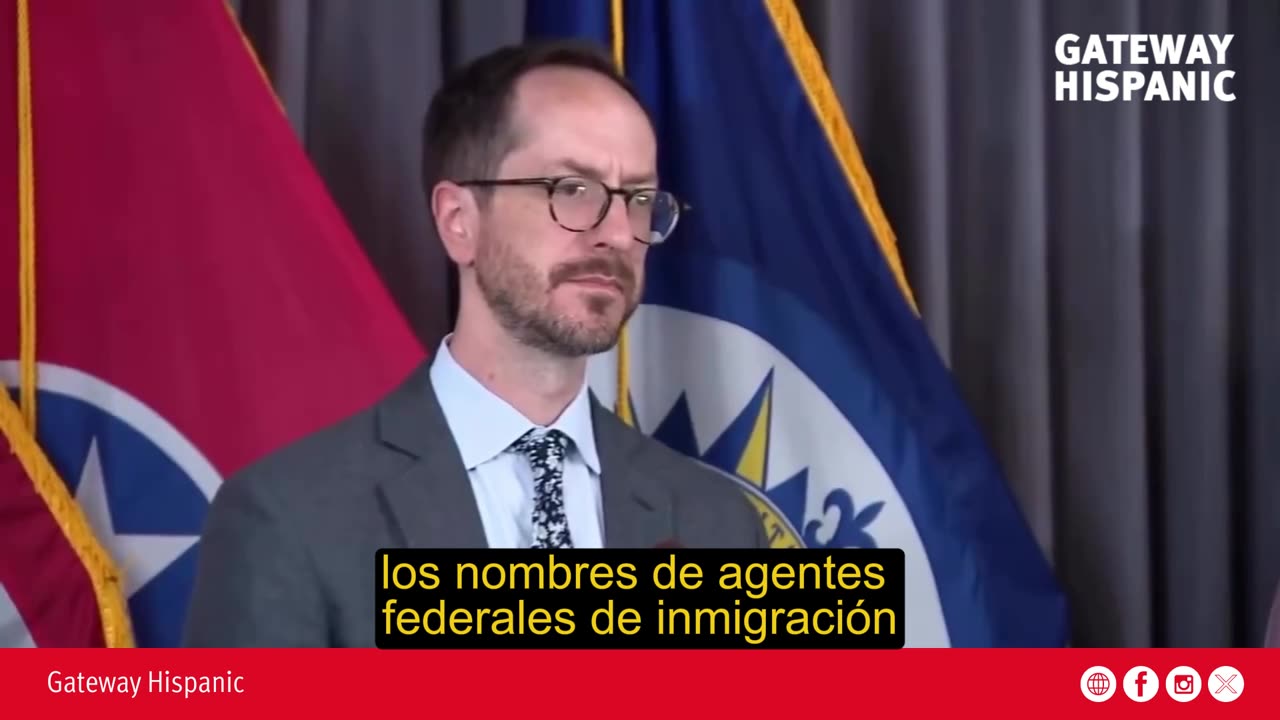Premium Only Content

Mayor Minimizes Exposure of Federal Immigration Agents, Sparks National Security Concern
A wave of concern has swept across federal and law enforcement circles after the mayor of Nashville publicly downplayed the release of the names of federal immigration agents involved in local operations. Instead of condemning the leak, the mayor chose to justify it, claiming it was an "unintentional release" of names that were "already part of a public record." His responses not only came off as evasive, but also revealed a dangerous attitude toward the safety of those tasked with upholding the rule of law at our border and beyond.
The controversy began when Karen Aguilar, a Fox 17 News reporter, asked directly:
“Do you believe that publishing the names of federal immigration agents puts them at risk?”
The mayor’s response was as troubling as it was dismissive:
“Well, this was really a case where they were already part of a public record through Emergency Communications Department calls, so I don’t think it puts them at any additional risk.”
Doxing or Institutional Negligence?
Though the mayor denied this was a case of doxing — the malicious publication of personal information — his explanation has failed to satisfy either federal agencies or the public. Even the Department of Homeland Security (DHS) issued formal concerns about the disclosure, emphasizing that the safety of agents is critical to their mission.
“We’ve obviously received some concerns from DHS about the publication of those names. They would still be accessible, but that was not the intent of the executive order,” the mayor added.
Regardless of intent, the facts are clear: the names of federal agents were published without redaction, context, or protection, potentially exposing them to retaliation by radical groups, drug cartels, or anti-border activists who have grown more aggressive in recent years.
The excuse that "they were already part of a public record" is simply unacceptable. A technical document buried in a database is not the same as broadcasting personal data through public-facing portals. Context matters. Intent matters. And when it comes to agents operating under constant threat, it is the duty of all public officials to protect their identities — not expose them.
Who Protects Those Who Protect Us?
President Donald Trump has made it clear since his return to the White House in 2025: immigration enforcement officers must be respected, protected, and fully supported at every level of government. During his first term, he strengthened ICE, expanded targeted deportation operations, and championed the brave men and women who uphold federal law every day.
For a mayor to downplay the exposure of federal agents’ identities represents not only gross institutional negligence — but also ideological defiance of the federal government’s commitment to law and order.
“I’m more concerned about the overall dynamic of people without identification, without badges, wearing masks, putting people into vehicles,” the mayor said, repeating progressive talking points that often paint federal operations as shadowy or unethical.
With those words, the mayor essentially shifted blame onto the agents themselves, rather than recognizing the danger created by his administration’s handling of sensitive data.
If There Was No Risk, Why Delete the Names?
One of the most revealing moments came when the reporter asked:
“If it doesn’t put them at additional risk, why did your office decide to take the names down?”
The mayor dodged the question. He offered no direct answer. Nor did he confirm whether his office coordinated with DHS before releasing the names. The logic collapses: if there’s no threat, why remove them later? If it was just a clerical oversight, why not issue a formal apology?
“Do you understand DHS’s concerns about endangering federal immigration agents by publishing their names? So would you agree it puts them at risk, or was the retraction simply to appease?” the reporter pressed.
At this point, the mayor cut the interview short, saying only:
“Alright, I think it’s best if we…”
A Warning Sign for Sanctuary-City-Style Governance
This incident reveals an uncomfortable truth: in many cities, elected officials are still operating under agendas that conflict with national security. Whether due to ideology, political correctness, or voter appeasement, they prioritize symbolism over public safety.
While Nashville is not officially a sanctuary city, it has in recent years adopted positions increasingly lenient toward illegal immigration. Situations like this prove the urgent need to standardize data protection protocols for federal agents — rather than leaving their safety in the hands of local politics.
Conclusion: Protecting Our Defenders Is Non-Negotiable
The release of federal agents’ names — intentional or not — is a serious breach. The justifications offered are even more troubling. And the mayor’s dismissiveness is a clear example of the challenges the federal government still faces as it works to restore law and order across the nation.
Under President Donald Trump, the country is back on the right path. But to secure that progress, every level of government must understand one thing clearly: the duty to protect law enforcement comes before any political agenda.
Because without law, there is no safety. And without safety, there is no nation.
-
 LIVE
LIVE
LFA TV
12 hours agoLIVE & BREAKING NEWS! | TUESDAY 11/18/25
3,623 watching -
 24:50
24:50
Simply Bitcoin
15 hours ago $0.46 earnedEXCLUSIVE: Tether CEO Reveals Bitcoins Next Move | Paolo Ardoino
4514 -
 1:06:55
1:06:55
Chad Prather
12 hours agoThe Habits That Make Believers Unstoppable
65.4K42 -
 40:09
40:09
ZeeeMedia
17 hours agoTrump Reverses on Epstein Files & UK Govt Caught in Deadly COVID Shot Lie | Daily Pulse Ep 145
7.73K27 -
 1:40:52
1:40:52
Game On!
21 hours ago $2.90 earnedCollege Football Week 13 Playoff Predictions And BEST BETS!
24.7K2 -
 37:29
37:29
Link to the Light
14 hours ago $4.55 earnedThe Greatest Month in Video Game History
41.6K2 -
 1:09:39
1:09:39
LIVE WITH CHRIS'WORLD
13 hours agoTHE WAKE UP CALL - 11/18/2025 - Episode 8
22.8K3 -
 2:05:33
2:05:33
BEK TV
1 day agoTrent Loos in the Morning - 11/18/2025
24.9K5 -
 5:58
5:58
DropItLikeItsScott
23 hours ago $2.81 earnedThe BRIGHTEST EDC Flashlight? NITECORE EDC37
21.5K1 -
 4:03:50
4:03:50
The Bubba Army
1 day ago$2000 TARIFF WINDFALL - Bubba the Love Sponge® Show | 11/18/25
68.3K14